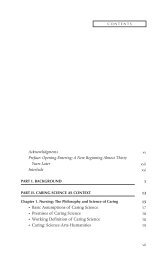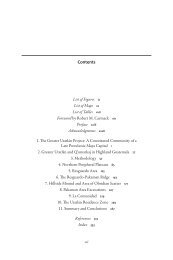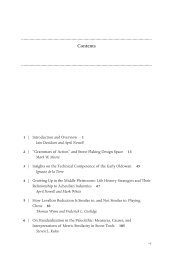free download - University Press of Colorado
free download - University Press of Colorado
free download - University Press of Colorado
You also want an ePaper? Increase the reach of your titles
YUMPU automatically turns print PDFs into web optimized ePapers that Google loves.
Responses to Explosive Volcanic Eruptions by Small to Complex Societies<br />
not as great, complex societies have shown impressive resilience in the long run,<br />
such as San Andres and surrounding settlements impacted by the ninth- to<br />
tenth-century eruption <strong>of</strong> Boqueron (VEI 4) and the Loma Caldera eruption<br />
in the fifth or sixth century (VEI 3), both in El Salvador (Sheets 2002, 2008).<br />
Decentralized egalitarian societies, such as those in the Arenal area, could<br />
react particularly rapidly to an emergency. Most decision-making occurred at<br />
the household level, presumably in the context <strong>of</strong> traditional oral knowledge,<br />
and evacuations could be effected at a moment’s notice. Because only a tiny<br />
fraction <strong>of</strong> the diet came from domesticated foods and regional population<br />
densities were very low, refuge areas beyond the devastation could readily support<br />
refugees. Repopulating the disaster areas were the descendants <strong>of</strong> the preeruption<br />
villagers (Sheets and Sever 2007), and no culture changes could be<br />
attributed to any <strong>of</strong> the eruptions and dislocations. Of course, I am not recommending<br />
that worldwide populations change their cultures and adaptations<br />
to emulate Arenal villagers, as the time when that could be done was passed<br />
many millennia ago. However, there is a clear lesson for present-day complex<br />
societies to instill nodes <strong>of</strong> authority dispersed among populations inhabiting<br />
hazardous areas. The thousands <strong>of</strong> stranded Katrina victims in New Orleans<br />
standing still and looking upward at TV cameras in helicopters, passively waiting<br />
for government assistance, provide a compelling case. They did not know<br />
what to do and waited for top-down authority. Unfortunately for them, the<br />
authority was as woefully unprepared as they were.<br />
Along with centralized authority in complex societies go redistributive<br />
economies. States are characterized as having high degrees <strong>of</strong> occupational<br />
specialization, and the products made by those specialists require elaborate<br />
systems to redistribute them. Such complex systems can function well under<br />
usual conditions but are subject to failure under unanticipated stresses. Further<br />
development <strong>of</strong> this topic could be done by modeling network structures with<br />
nodes and links, but that is beyond the scope <strong>of</strong> this chapter.<br />
One <strong>of</strong> the smallest eruptions in the sample, the eighth-century eruption<br />
<strong>of</strong> Baru in Panama, had surprisingly severe consequences on the Barriles<br />
ranked societies (chiefdoms). They had to completely abandon the area, and<br />
they never reoccupied it even after full ecological recovery. Rather, they had to<br />
migrate over the divide and down into the much more humid tropical rainforest<br />
on the Caribbean side and fundamentally change their adaptation, settlement<br />
pattern, and other culture elements. I believe this is primarily because the<br />
chiefdoms were in a state <strong>of</strong> chronic warfare and thus made themselves vulnerable<br />
to a sudden unanticipated stress, even a very small one when compared<br />
with the other eruptions under consideration here.<br />
Earlier in this chapter I gave some thought to encoding hazard and disaster<br />
information into myth and religion. That encoding can give societies templates<br />
for behavior and can <strong>of</strong>ten save lives, such as the traditional peoples<br />
57





